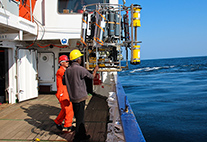Fishing grounds off the coast of southwest Africa: not yet affected by climate change
15 February 2016, by CEN Universität Hamburg

Photo:
Climate research in the Hamburger Abendblatt: Kay Emeis is currently researching whether the ecological changes off the coast of southwest Africa are the product of climate change.
Off the coast of southwest Africa, the cold Benguela Current flows toward the Equator. Though the region is normally one of the richest sources of fish on the planet, the fish population dropped rapidly in the 1980s. Instead of the once-abundant schooling fish, like sardines and herrings, fishers suddenly began hauling in masses of jellyfish – and the residents of Angola, Namibia and South Africa lost an important source of income. Could this have been an early sign of climate change?
Researchers around the world are currently analyzing the Benguela region and the changes at work there, assessing various sub-processes so as to eventually grasp the whole puzzle. My own research focuses on the question of how ecosystems in the region are responding to the global climate change.
The Benguela region is one of the major upwelling areas, where water from the ocean depths rises to the surface. Upwelling involves a complex interplay of winds and ocean movements due to the Earth’s rotation. The southeasterly trade wind, which blows constantly there, pushes the surface water out to sea. Balancing this factor, at the coast cold water rises to the surface from depths as great as 200 meters, transporting large quantities of nutrients with it. This allows vegetable and animal organisms to thrive, in turn providing optimal feeding grounds for fish.
In the course of our research project, we have now succeeded in fitting together some of the pieces of the Benguela puzzle. My colleague Nele Tim and I first investigated where the water flows at which times. By combining data from ocean sediments, meteorological records and computer simulations, we were able to determine that the upwelling is not a constant phenomenon; there are variations from season to season, and over longer timeframes ranging from years to decades. Further, there are differences between the northern and southern Benguela region.
We then looked into the wind conditions, which are the motor of the water movements. We statistically evaluated parameters like air pressure and the intensity of coastal air currents. The results show that three factors intensify upwelling in the Benguela region: a stronger high-pressure area over the South Atlantic, a more powerful southeasterly trade wind, and a greater pressure differential between the ocean and adjacent land. These factors have a major influence on water circulation, and with it, the food supply for local organisms. If for example the high-pressure area over the South Atlantic begins to falter, the trade wind will do likewise and upwelling will decline.
In order to gauge how climate change is impacting these processes, Nele Tim used computer models to analyze the past 1,000 years – and found the natural fluctuations in wind conditions are so great that the effects of anthropogenic climate change haven’t yet affected them. However, if the amount of greenhouse gas emissions rises unabated through 2100, it could greatly intensify upwelling, with incalculable consequences for the ecosystem as a whole.
Prof. Kay-Christian Emeis is a geologist, whose current focus is on the influence of climate change on marine material flows.
